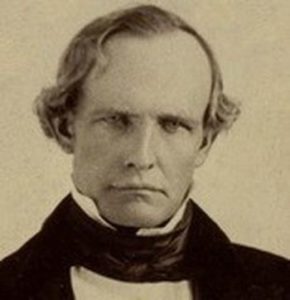
Peter Burnett
*Peter Burnett was born on this date in 1807. He was a white-American slave owner and politician who enforced discriminatory legislation against Black Native Americans and Chinese immigrants in the West.
Raised in a slave-owning family in Missouri, Peter Hardeman Burnett moved westward after his business left him heavily in debt. Initially residing in Oregon Country, he would become Supreme Judge of the Provisional Government of Oregon.
While in Oregon politics, he would push for the total exclusion of African slaves or freedmen from the territory. He would author the infamous "Burnett's lash law" that authorized the flogging of any free Blacks who refused to leave Oregon; the law was deemed "unduly harsh" and went unenforced before voters rescinded it in 1845. In 1848, Burnett moved to California during the height of the Gold Rush. He would re-establish his political career and be appointed to serve on the Supreme Court of California.
In this capacity, Burnett ordered the infamous extradition of Archy Lee, a formerly enslaved man living in Sacramento, back to Mississippi. Though Burnett had owned two slaves, he opposed calls to make California a slave state instead of pushing for the total exclusion of Blacks in California. He served as the first elected Governor of California from December 20, 1849, to January 9, 1851. Burnett was elected Governor almost one year before California's admission to the Union as the 31st state in September 1850.
As Governor, Burnett would sign into law the so-called Act for the Government and Protection of Indians, which enabled the enslavement and genocide of Native Californians. He would declare in an 1851 speech "that a war of extermination will continue to be waged between the races until the Indian race becomes extinct must be expected."
Efforts by federal negotiators to preserve some Native land rights were fought by the administration of Burnett, who favored the elimination of California's indigenous peoples. Furthermore, Burnett is noted for being an early proponent of excluding Chinese immigrant laborers from California and, following his governorship, would advocate for the federal Chinese Exclusion Act. Burnett's legacy is largely mixed. While regarded as one of the fathers of modern California in the state's early days, his racist attitudes towards Blacks, Chinese, and Native Americans have tarnished his name today.
Burnett's period in the Oregon Provisional Legislature helped facilitate the exclusion of Blacks from the state until 1926. Also, his open hostility to foreign laborers influenced several federal and state California legislators to push future xenophobic legislation, such as the Chinese Exclusion Act, 30 years after he departed from the governorship. Burnett was also an open advocate of exterminating local California Indian tribes. This policy continued with successive state governmental administrations for several decades, which offered US$10 to US$25 for evidence of dead Natives.
Peter Hardeman Burnett died on May 17, 1895. San Francisco's Burnett Avenue near the Haight-Ashbury neighborhood is named after him. The Burnett Child Development Center, a predominantly black San Francisco neighborhood preschool, had been named for Burnett. However, when Burnett's racist positions were rediscovered, the school was renamed in 2011 to the Leola M. Havard Early Education School in honor of San Francisco's first Black principal. Similarly, the Peter H. Burnett Elementary School in Long Beach has been recently renamed due to Burnett's views. It is now named after Bobbi Smith, the first Black board member of Long Beach Unified School District.